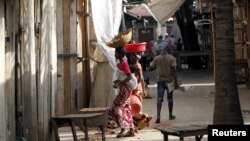The political crisis in Burundi is affecting an already struggling economy. International aid groups are threatening to pull out, unemployment is on the rise and prices of basic goods are increasing.
At the warehouse of a rice supplier in Bujumbura, all activities abruptly stopped a few weeks ago. Policemen came and accused the manager of selling rice to protesters. The authorities immediately shut down the place, says a worker, who wished to remain anonymous to protect his privacy.
He says he is in charge of loading the rice for clients and that he could usually make about $2 to $5 per day. But these days, he says, it is very tough and he will probably go back home empty-handed. He says this closure affects everybody, workers and traders alike. Everybody's lives are jeopardized because of it, he says.
Economic impact
Over the past few weeks, Burundi has been facing the most serious political crisis since the end of the civil war a decade ago.
Violent protests have been happening almost daily in the capital city of Bujumbura after President Pierre Nkurunziza announced his intention to seek a third term in office — a decision that critics claim violates the constitution.
These weeks of unrest have had a deep impact on the fragile economy of one of the poorest countries in the world.
Some shops and companies had to suspend their activities because of the insecurity. Road barricades have prevented the transportation of staple foods such as rice, says Estelle, a vendor on one of Bujumbura's market.
She says the price of Tanzanian rice has increased and that it becomes harder to get because suppliers are scared to transport it because of the barricades and the insecurity.
Malnutrition on the rise
More than half the Burundian population suffers from malnutrition. The latest rise in food prices has added another pressure on them, says Michael, who struggles to afford a basket of food at the market.
He says the price of everything has gone up. He used to buy a kilogram of meat for about $2, but now it cost almost $3. He says it is the same for rice and tomatoes, all the prices have gone up, he says, and it is very hard to afford these products now.
Some political analysts say the end of violence may not equal the end of the economical crisis, especially if Nkurunziza is re-elected.
Half of the country's budget comes from foreign aid and one of its main financial backers, Belgium, has already threatened to pull out if Nkurunziza remains in power.





